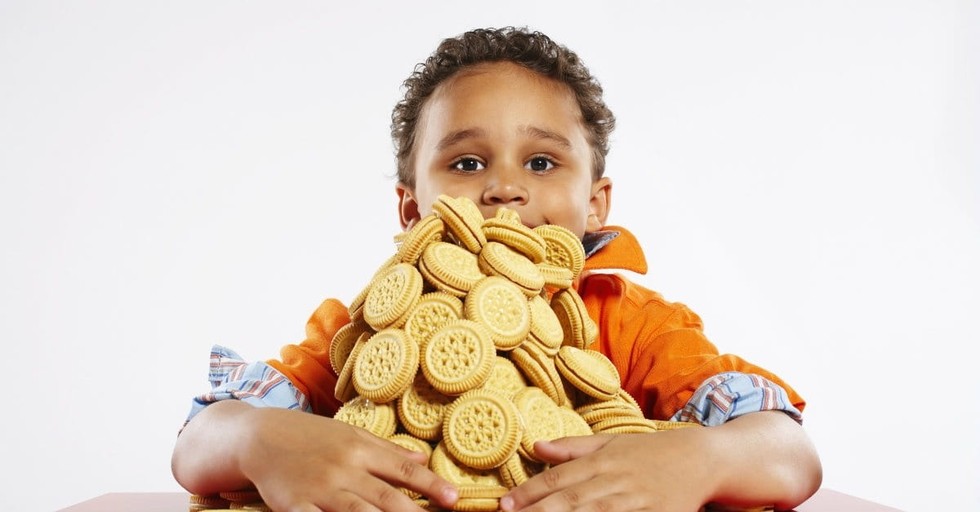10 Ways Entitlement Manifests Itself in Our Kids
- Jennifer Waddle iBelieve Contributor
- Updated Aug 11, 2017

Entitlement: belief that one is deserving of or entitled to certain privileges.
I grew up in a small Kansas town that didn’t have a shopping mall. So, when we went to any city that had one, it was a BIG deal. One year in particular, we visited the mall just before Christmas. A new music store had just opened, and my 13-year-old self thought she was in heaven! Cassette tapes lined the shelves, Bon Jovi posters lined the walls, and it didn’t take me long to find something I really wanted—a piano book featuring the greatest hits from the 80s.
I wanted that book. I deserved that book. As a dutiful piano student, I was entitled to that book! Problem was, I didn’t have any money. So, I “pretty-pleased” my parents to death, until they finally lost patience and said it was time to go home—without the book. I wasn’t merely upset. I was mad! I threw a silent fit all the way home and held a grudge until Christmas morning, when one of the gifts I opened was that coveted piano book.
Entitlement has a sneaky way of getting the best of us. Kids, especially, find it easy to believe they are deserving of certain things or entitled to certain privileges. Here are 10 ways entitlement manifests itself in our kids.
Photo credit: ©Thinkstock/AshleighWellsPhotography
-
![1. Laziness]()
1. Laziness
Slide 1 of 10“I just want my kid to be a kid for as long as possible.”
Does that sound familiar? I get it. I want my kids to have happy, carefree childhoods as well. However, a good work ethic is one of the most important things we can cultivate in them. Entitlement has a way of stifling a kid’s drive to work hard and accept responsibility.
Preparing our kids for “real life” isn’t robbing them of a great childhood. Rather, it is equipping them with skills to be successful in college, career, marriage, and beyond. Let’s remind our children that working hard is a way of serving God and taking good care of what He’s given them.
“Whatever you do, work at it with all your heart, as working for the Lord, not for human masters, since you know that you will receive an inheritance from the Lord as a reward. It is the Lord Christ you are serving.” (Colossians 3:23-24 NIV)
Photo credit: ©Thinkstock/Voyagerix
-
![2. Lofty Expectations]()
2. Lofty Expectations
Slide 2 of 10Have you ever stopped to think about how we condition our kids to have unrealistic expectations? For example, we host extravagant birthday parties with jump houses, fancy cakes, and oodles of gifts. And while celebrating isn’t a bad thing, the lofty expectations we are creating can be. Last year’s party becomes “old hat” and we have to “up the ante” every year. Kids become conditioned, always expecting bigger and better.
Perhaps, we can scale back to simpler times, by cooking their favorite meal at home, making the birthday cake ourselves, and doing something memorable as a family. I would even venture to say that our kids will remember these types of celebrations more than the elaborate ones. It’s relationship building that will matter most in the long run.
“Then he said to them, ‘Watch out! Be on your guard against all kinds of greed; life does not consist in an abundance of possessions.’” (Luke 12:15 NIV)
Photo credit: ©Thinkstock/Deklofenak
-
![3. Self-Centeredness]()
3. Self-Centeredness
Slide 3 of 10The “me, myself, and I” mentality has exploded in recent years. And let’s face it, we all struggle with this issue from time to time. There truly is nothing new under the sun!
I’m reminded of Genesis, chapter 4, when Cain was jealous that his brother Abel’s sacrifice was more accepted than his. The Bible says that he was “very angry and his countenance fell.” Cain’s self-centered view of the situation clouded his vision of what was right, and he eventually killed his brother over the matter.
Now, I am not suggesting that self-centeredness leads to murder. I’m merely pointing out that kids who think only of themselves often suffer from entitlement that is expressed through anger and resentment. There is something called the I’m Third Principle that encourages our kids to put God first, others second, and self last. Here is a great story from history from which that principle originates.
“Do nothing out of selfish ambition or vain conceit. Rather, in humility value others above yourselves…” (Philippians 2:3 NIV)
Photo credit: ©Thinkstock
-
![4. Inability to Empathize]()
4. Inability to Empathize
Slide 4 of 10Empathy is a huge character trait to instill in our children. This attribute helps our kids relate to others with kindness and compassion. Unfortunately, entitlement prevents our kids from being aware of the hardships others may be going through.
One of the best ways to combat this is to be empathetic ourselves; to include our children in community outreach. Taking homemade Christmas cards to a nursing home, serving food to the homeless on Thanksgiving, or passing out stuffed animals at a children’s hospital can be wonderful ways to build empathy. Here are even more ideas for cultivating empathy in our kids.
“But do not forget to do good and to share, for with such sacrifices God is well pleased.” (Hebrews 13:16 NKJV)
Photo credit: ©Thinkstock/Jaruwan Jaiyangyuen
-
![5. Greed]()
5. Greed
Slide 5 of 10When did we start feeling guilty about our kids not having the newest, biggest, and best of everything? From iPads to cell phones, toys and clothing, we put a lot of pressure on ourselves to lavish our kids with everything their hearts desire. But that inner-sense of greed can get out of control when we give our kids too much of a good thing.
What if we allow our kids to wait longer for things? Save their own money? Do extra chores to earn what they want? Let’s encourage a heart of giving in our children and watch some of that entitlement disappear. Check out this article from World Vision on the Top 5 Ways to Raise a Generous Child at Any Age.
“The generous will themselves be blessed, for they share their food with the poor.” (Proverbs 22:9 NIV)
Photo credit: ©Thinkstock/Wavebreakmedia Ltd
-
![6. Prejudice]()
6. Prejudice
Slide 6 of 10I thought twice about including this point, but felt a strong sense that it needed to be mentioned. Human prejudice has destroyed countless lives throughout history and continues to this day. I am heartsick over the terrible things that have happened to innocent people due to prejudice.
You may be wondering how entitlement relates to this topic, but it’s not hard to connect the dots. When kids feel superior, in any way, it can open the door to all kinds of unfair assumptions about others. Thoughts like “I am better than them,” or “Those people are beneath me,” are clear manifestations of entitlement and can lead to segregation, bullying, or worse.
Our own attitudes, comments, and opinions about others will have a big impact on our kids. When we make it clear that we have zero-tolerance for prejudice—and reinforce it—our kids are more likely to be loving and considerate of others.
“Do to others as you would have them do to you.” (Luke 6:31 NIV)
Photo credit: ©Thinkstock
-
![7. Discontentment]()
7. Discontentment
Slide 7 of 10Have you ever noticed that entitled kids seem to be the most miserable? Easily disappointed, often irritable, and frequently dissatisfied, children who battle entitlement are rarely happy with what they have. This can become a real problem if left unchecked.
Imparting a heart of gratefulness is one of the quickest remedies for discontentment. Getting our kids to recognize the blessings from God is a big first step. We can point out the ways God loves and cares for us. We can attribute our well-being to His grace and mercy. And above all, we can remind our kids that every good thing comes from the hand of God.
“Give thanks to the Lord, for He is good; His love endures forever.” (Psalm 106:1 NIV)
Photo credit: ©Thinkstock/Wavebreakmedia Ltd -
![8. Brattiness]()
8. Brattiness
Slide 8 of 10I’m sure I don’t have to paint a picture of brattiness for you. We’ve all experienced fit throwing, outbursts, silent treatments, and a whole host of unpleasantries from our kids. (Remember my bratty “I-want-that-piano-book-now” example?)
Although these stages are common, bratty behaviors shouldn’t be ignored. Kids need to learn boundaries and respect for authority in order to grow up as thriving adults. Too many times, children have been allowed to continue in their brattiness, and they struggle with entitlement well into adulthood.
Let’s consider the wealth of wisdom found in the book of Proverbs. God has given us the perfect game-plan for raising kids who are loved, disciplined, and equipped for real life. Here are a few verses to get you started. (Proverbs 13:24,19:18, 22:6, 22:15, 23:13-15, 29:17)
Photo credit: ©thinkstock/Nomadsoul1
-
![9. Lack of Appreciation]()
9. Lack of Appreciation
Slide 9 of 10It used to be that children would pitch in however they could to help the family unit thrive. Kids worked hard on the farm, had paper routes, and did whatever it took to support themselves and their parents.
I’m afraid modern culture has fueled a severe lack of appreciation in our kids. When things come too easy, they take things for granted, not realizing the hours of work that goes into providing for them.
One idea is to have an open discussion with our children about what it takes to pay for the necessities they take for granted. For example, by pointing out that it takes X amount of hard-working hours to pay the electric bill each month, we may get our kids to think outside of their entitlement bubble. By teaching them the value of things, we can foster a heart of appreciation for what they have.
“Now he who supplies seed to the sower and bread for food will also supply and increase your store of seed and will enlarge the harvest of your righteousness.” (2 Corinthians 9:10 NIV)
Photo credit: ©Thinkstock/flyparade
-
![10. Lack of Humility]()
10. Lack of Humility
Slide 10 of 10The Bible says that pride comes before a fall. Without humility, kids will struggle in school, in friendships, and eventually in their relationship with God. Entitlement doesn’t leave much room for humility. In fact, it stands against any thoughts of being humble and exerts itself as self-righteousness.
We can teach our kids humility by turning to Jesus, the only One who is righteous, who bore our sin and shame on the cross. Nothing dispels entitlement quicker than remembering Jesus’ unmerited sacrifice for us. “I deserve it” attitudes turn to meekness when there is a clear understanding of God’s mercy through the death and resurrection of His son.
“Therefore, since we are surrounded by such a great cloud of witnesses, let us throw off everything that hinders and the sin that so easily entangles. And let us run with perseverance the race marked out for us, fixing our eyes on Jesus, the pioneer and perfecter of faith. For the joy set before him he endured the cross, scorning its shame, and sat down at the right hand of the throne of God.” (Hebrews 12:1-2 NIV)
Jennifer Waddle is best known for offering Biblical encouragement for women in the trenches of life. She is the author of several books, includingPrayer Worrier: Turning Every Worry into Powerful Prayer.She is also a contributor for GotQuestions.org and WomensMinistryTools.com. She resides with her family near the foothills of Cheyenne Mountain—her favorite place on earth.You can connect with her at www.jenniferwaddleonline.com or find her books here.
Photo credit: ©Thinkstock/Digital Vision.



 Previous
Previous








